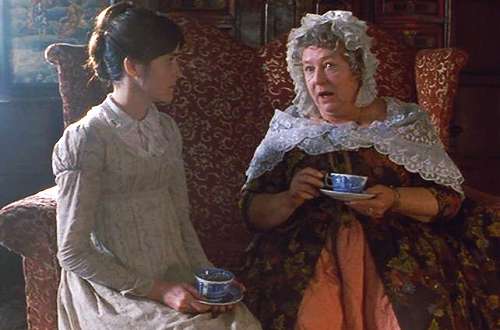
Wednesday
I am deeply grateful to be on good terms with my two daughters-in-law, whom I saw again recently for the first time since pre-Covid. Not everyone is so lucky. I was talking to a friend recently whose wonderful daughter is disliked by her mother-in-law. (That her mother-in-law is a rabid Trump supporter makes it even worse, but their friction predates Trump.) My friend advised her daughter that, if she ever feels the need to vent, to do so to her rather than to her husband. After all, a wife-mother battle puts him in a no-win situation. Fortunately, as he sees his mother with clear eyes, no wedge has been driven between him and his wife. Still, my friend’s advice is useful, and her daughter has followed it.
I think how valuable it is to have such third person interlocutors. Anne Elliot, my favorite Austen heroine, plays such a role in Jane Austen’s Persuasion.
In this case, it is the daughter rather than the mother-in-law who is at fault. Anne’s sister Mary is the spoiled wife of Charles Musgrove and complains constantly about her mother-in-law, who lives close by. When Anne visits, she hears from both parties. In this case, the children are a major cause of contention:
One of the least agreeable circumstances of [Anne’s] residence there was her being treated with too much confidence by all parties, and being too much in the secret of the complaints of each house. Known to have some influence with her sister, she was continually requested, or at least receiving hints to exert it, beyond what was practicable….
Mary’s declaration was, “I hate sending the children to the Great House, though their grandmamma is always wanting to see them, for she humors and indulges them to such a degree, and gives them so much trash and sweet things, that they are sure to come back sick and cross for the rest of the day.” And Mrs. Musgrove took the first opportunity of being alone with Anne, to say, “Oh! Miss Anne, I cannot help wishing Mrs. Charles had a little of your method with those children. They are quite different creatures with you! But to be sure, in general they are so spoilt! It is a pity you cannot put your sister in the way of managing them. They are as fine healthy children as ever were seen, poor little dears! without partiality; but Mrs. Charles knows no more how they should be treated–! Bless me! how troublesome they are sometimes. I assure you, Miss Anne, it prevents my wishing to see them at our house so often as I otherwise should. I believe Mrs. Charles is not quite pleased with my not inviting them oftener; but you know it is very bad to have children with one that one is obligated to be checking every moment; “don’t do this,” and “don’t do that;” or that one can only keep in tolerable order by more cake than is good for them.”
To give you a sense of Mary, being from the upper-class Elliot family she has the right to precede her mother-in-law into formal dinners. That she insists on this privilege marks her out as a snob. One of her sisters-in-law complains about it to Anne:
Again, it was Mary’s complaint, that Mrs. Musgrove was very apt not to give her the precedence that was her due, when they dined at the Great House with other families; and she did not see any reason why she was to be considered so much at home as to lose her place. And one day when Anne was walking with only the Musgroves, one of them after talking of rank, people of rank, and jealousy of rank, said, “I have no scruple of observing to you, how nonsensical some persons are about their place, because all the world knows how easy and indifferent you are about it; but I wish anybody could give Mary a hint that it would be a great deal better if she were not so very tenacious, especially if she would not be always putting herself forward to take place of mamma. Nobody doubts her right to have precedence of mamma, but it would be more becoming in her not to be always insisting on it. It is not that mamma cares about it the least in the world, but I know it is taken notice of by many persons.”
Infinitely patient Anne responds through gentle hints:
How was Anne to set all these matters to rights? She could do little more than listen patiently, soften every grievance, and excuse each to the other; give them all hints of the forbearance necessary between such near neighbors, and make those hints broadest which were meant for her sister’s benefit.
Of course, it’s best if one can communicate directly without the need for go-betweens. We generally have achieved this with our own daughters-in-law although even we, upon occasion, have received gentle hints from our sons on certain matters (usually concerning the grandchildren). And although my wife and my 95-year-old mother, with whom we now live, have become best friends, there have been times when I have been called upon to channel my inner Anne Elliot. Even in the best of situations, one stumbles upon an occasional mine.
But minefield or no, Anne acknowledges that Musgrove family life is much richer than the sterile isolation in which her pretentious father and elder sister live. When her navy husband is called to duty and she must seek out family, she is more likely to spend time with the Musgroves than with Sir Walter and Miss Elliot.

